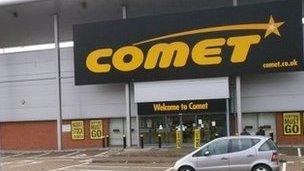Comet collapse to cost the government £49.4m
- Published

Comet went into administration last month
The collapse of electrical chain Comet will cost the government £49.4m in redundancy payments and tax revenues, administrators Deloitte have revealed.
The redundancy money owed to thousands of former Comet workers totals £23.2m, and will be paid by the government's Redundancy Payments Service (RPS).
Meanwhile, £26.2m is owed in taxes to HM Revenue & Customs (HMRC).
The last 49 Comet stores will close on Tuesday. Comet went into administration last month.
Big losses
Comet's demise is one of the biggest High Street casualties of recent years.
The 236-store business, which at the time employed about 7,000 people, was bought last year for the nominal sum of £1 by private equity firm OpCapita.
OpCapita bought the Comet from Kesa Electrical, which also gave OpCapita £46.8m of working capital.
However, OpCapita failed to turnaround Comet's fortunes, as the company continued to suffer from the fall in UK consumer spending during the recession, and the big growth in online rivals.
Comet was founded in Hull in 1933 and began life selling batteries and radios.
The closure of the final Comet's stores comes after Deloitte failed to find a buyer for the company.
Deloitte also revealed on Monday that Comet's losses in the year to April totalled £95m, while its revenues slumped by £200m.
In the subsequent five months, Comet lost a further £31m.
Kesa Electricals was renamed Darty in July this year.
Despite having its headquarters in London, it focuses on the continental market - especially France, where it has more than 200 stores under the Darty name.
- Published28 November 2012
- Published19 November 2012
- Published13 February 2013